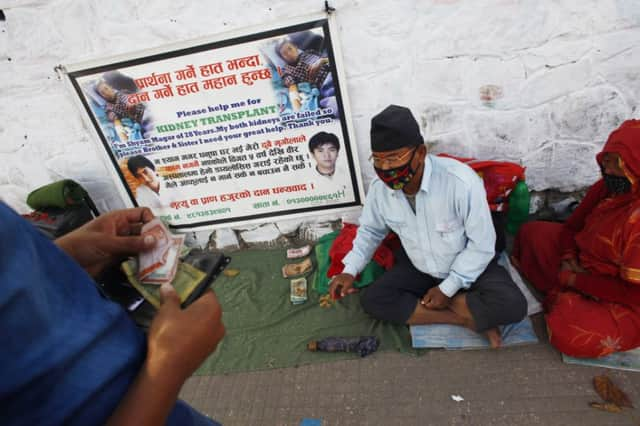Poor Nepalese selling their organs for transplants


One man, Kumar Budathoki, has revealed he sold one of his kidneys to organ traffickers for $5,000 (£3,200), a sum he hoped would help set him up for a lifetime free of money problems.
Instead, he got a lifetime of health problems – and only a fraction of the money promised to him by a broker in Hokshe, a village of tiny farms and mud huts that has been the centre of the illegal organ trade in Nepal for more than a decade.
Advertisement
Hide AdAdvertisement
Hide AdOnly about 4,000 people live here, yet 121 of them have sold their kidneys, said Krishna Pyari Nakarmi, who has been leading the campaign against the kidney trade in Hokshe.
Those are only the cases she has been able to document, and she believes the number could be much higher.
Despite a recent clampdown, authorities warn the promise of easy money could easily erase any gains made against the organ traffickers. And villagers who already sold their kidneys continue to suffer the health consequences.
“I sold my kidney because I wanted to buy some land to give my family a good life,” said Mr Budathoki, 37, outside the two-storey mud home where he lives with his mother, his wife and two teenage children.
“But now I have no job, deteriorating health and no future for my family,” he said.
The black market for human organs is believed to be flourishing around the world, with kidneys the most common because they can be harvested from live donors.
In Hokshe, traffickers have operated with surprising impunity. Nearly every resident seems to know someone who sold a kidney on the black market.
Dr Rishi Kumar Kafle of the National Kidney Centre in Katmandu said while there is illegal organ trafficking elsewhere in Nepal, he knows of no place where it has been as pervasive as it is in Hokshe.
Advertisement
Hide AdAdvertisement
Hide AdFor more than a decade, traffickers openly stalked the village, high in the mountains outside Kathmandu, scouting for farmers and poor labourers to lure or dupe into giving up kidneys. Many residents are illiterate and were all too willing to go under the knife.
Over the years, the village earned the nickname “the kidney bank”.
The donors, promised hundreds or even thousands of dollars in a country where per capita income is only $700, would then cross the border into India for the surgery, with their organs destined for wealthy patients there.
Mr Budathoki gave up his kidney nearly 15 years ago. He said the broker down-played the risks of the surgery. Once he got to India, Mr Budathoki could not understand the doctors because they spoke to him in Tamil and Hindi. He speaks only Nepali.
“I never understood what the doctors and people in India were talking about so all I did was nod and sign papers,” he said.
The donors travelled to India because transplants generally were impossible in Nepal. Until 2008 the surgery was illegal; after that, only close relatives were allowed to donate, and even they had to pass through strict government screening.
Mr Budathoki said even now, the incision where a doctor removed the kidney still hurts. And Budathoki’s wife and younger brother are suffering, too. They sold kidneys after he did.
Years of campaigning along with more recent monitoring by police, have curbed trafficking significantly. Police arrested ten traffickers last year. Three of them are in jail. The others are out on bail and awaiting trial.
But the temptation remains.